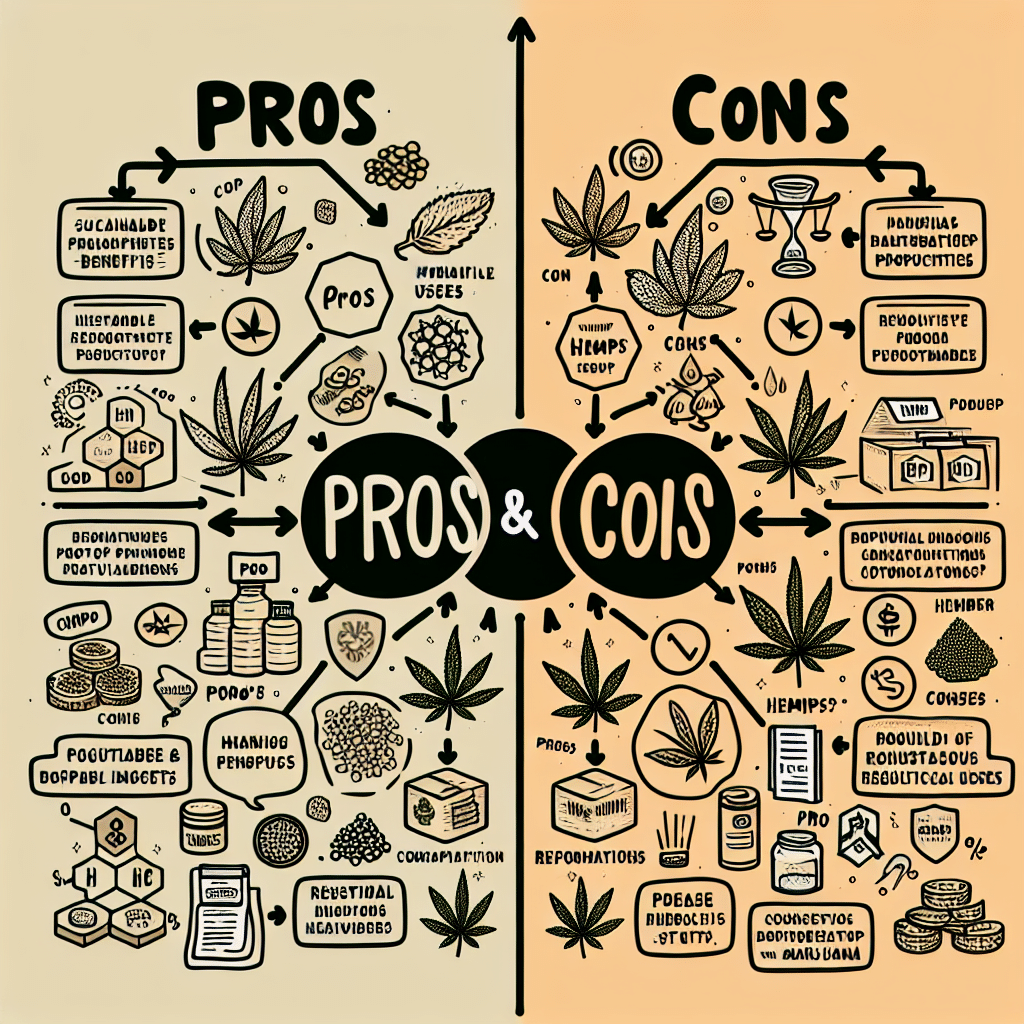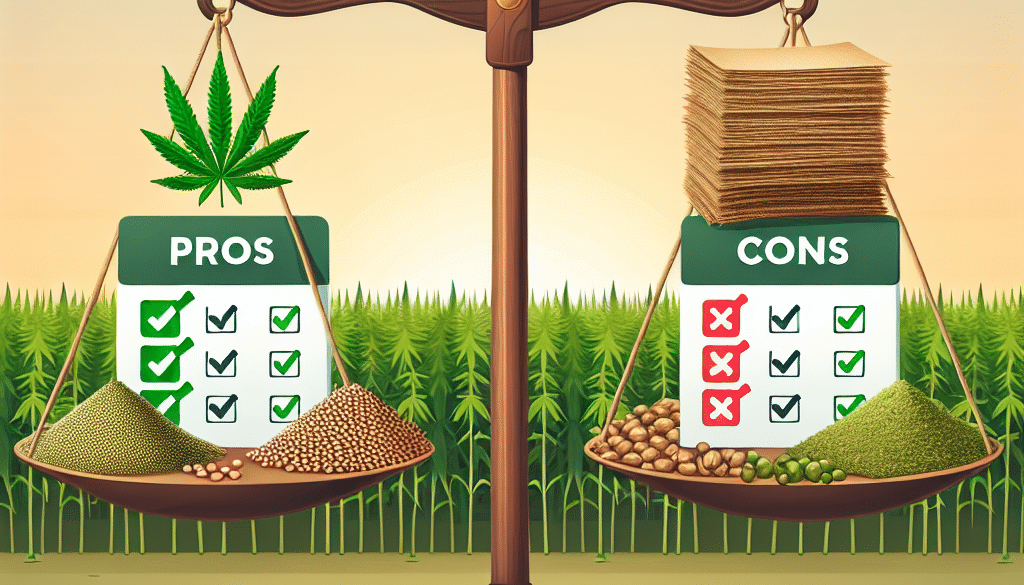What Are The Pros And Cons Of Hemp Products?
-
Table of Contents
- Hemp Products: Weighing the Benefits Against the Drawbacks
- The Advantages of Hemp Products
- Environmental Impact of Hemp Cultivation
- Health and Economic Benefits of Hemp
- The Disadvantages of Hemp Products
- Challenges in Hemp Processing and Production
- Consumer Perception and Legal Hurdles
- Case Studies and Statistics
- Conclusion: Balancing the Scales
- Discover ETprotein’s Hemp Protein Products
Hemp Products: Weighing the Benefits Against the Drawbacks

Hemp, a variety of the Cannabis sativa plant species, has been cultivated for thousands of years for its fiber, seeds, and oil, which are used to produce a wide range of products. With the recent surge in popularity of sustainable and eco-friendly materials, hemp products have gained significant attention. However, as with any product, there are both advantages and disadvantages to consider. This article explores the pros and cons of hemp products, providing a balanced view for consumers and industry stakeholders.
The Advantages of Hemp Products
Hemp products offer a multitude of benefits, from environmental sustainability to health and economic advantages. Here are some of the key pros:
- Eco-Friendly and Sustainable: Hemp is a highly sustainable crop that grows quickly, requires relatively little water, and does not need high levels of pesticides or herbicides. Its cultivation can help reduce the carbon footprint and contribute to soil health.
- Versatile Raw Material: Hemp can be used to make a variety of products, including textiles, building materials, biofuels, paper, and biodegradable plastics. This versatility makes it a valuable resource in multiple industries.
- Nutritional Benefits: Hemp seeds are rich in essential fatty acids, protein, vitamins, and minerals. They are considered a superfood and can contribute to a balanced diet.
- Health and Wellness: Hemp oil and CBD (cannabidiol) derived from hemp have been associated with numerous health benefits, such as reducing inflammation, pain relief, and potential anxiety reduction.
- Economic Potential: The hemp industry offers economic opportunities for farmers and entrepreneurs. The growing demand for hemp products can lead to job creation and new markets.
Environmental Impact of Hemp Cultivation
Hemp’s positive environmental impact is one of its most compelling advantages. It absorbs more CO2 per hectare than forests, making it an excellent carbon sink. Additionally, hemp’s deep roots prevent soil erosion and help detoxify the soil by removing harmful chemicals and pollutants.
Health and Economic Benefits of Hemp
The health benefits of hemp products, particularly hemp seeds and oil, are well-documented. They are a great source of plant-based protein and contain a balanced ratio of omega-3 and omega-6 fatty acids. Economically, the hemp industry can revitalize rural economies and offer a profitable alternative crop for farmers.
The Disadvantages of Hemp Products
Despite the numerous benefits, there are also some drawbacks to hemp products that must be considered:
- Regulatory Challenges: Hemp production and sale are heavily regulated in many countries due to its association with marijuana, despite hemp containing only trace amounts of THC (the psychoactive compound). This can hinder market growth and innovation.
- Market Misunderstanding: The stigma surrounding cannabis can lead to misconceptions about hemp and its uses, potentially affecting consumer acceptance and market growth.
- Processing Costs: The infrastructure for processing hemp is not as developed as for other crops. This can lead to higher costs for manufacturing hemp products, making them less competitive price-wise.
- Limited Research: While there is growing interest in the potential health benefits of hemp-derived CBD, there is still a need for more comprehensive research to fully understand its effects and potential side effects.
Challenges in Hemp Processing and Production
The processing of hemp into usable fibers and other materials can be labor-intensive and costly. The lack of specialized machinery and processing facilities can be a barrier to entry for many producers, potentially limiting the growth of the hemp industry.
Consumer Perception and Legal Hurdles
The legal landscape for hemp is complex and varies widely between jurisdictions. This can create confusion for consumers and businesses alike. Additionally, the association with cannabis can lead to negative perceptions that may influence consumer behavior and hinder the adoption of hemp products.
Case Studies and Statistics
Several case studies highlight the growing interest in hemp products. For example, the use of hempcrete in construction has been shown to improve insulation and reduce energy costs. In the textile industry, hemp fabrics are being praised for their durability and breathability.
Statistics show that the global hemp market size was valued at USD 5.66 billion in 2020 and is expected to expand at a compound annual growth rate (CAGR) of 22.5% from 2021 to 2028. This growth is indicative of the increasing demand for hemp products across various sectors.
Conclusion: Balancing the Scales
In conclusion, hemp products offer a range of environmental, health, and economic benefits that make them an attractive option for consumers and businesses. However, regulatory hurdles, processing costs, and market misconceptions present challenges that need to be addressed. By understanding the pros and cons of hemp products, stakeholders can make informed decisions and contribute to the responsible growth of the industry.
Discover ETprotein’s Hemp Protein Products
If you’re interested in exploring the benefits of hemp protein, ETprotein offers a range of high-quality hemp protein products. Their offerings are characterized by a neutral taste, non-GMO, allergen-free attributes, with high purity levels, catering to various industries including nutraceuticals, pharmaceuticals, and food and beverage.
About ETprotein:
ETprotein, a reputable protein and L-(+)-Ergothioneine (EGT) Chinese factory manufacturer and supplier, is renowned for producing, stocking, exporting, and delivering the highest quality organic bulk vegan proteins and L-(+)-Ergothioneine. They include Organic rice protein, clear rice protein, pea protein, clear pea protein, watermelon seed protein, pumpkin seed protein, sunflower seed protein, mung bean protein, peanut protein, and L-(+)-Ergothioneine EGT Pharmaceutical grade, L-(+)-Ergothioneine EGT food grade, L-(+)-Ergothioneine EGT cosmetic grade, L-(+)-Ergothioneine EGT reference grade and L-(+)-Ergothioneine EGT standard. Their offerings, characterized by a neutral taste, non-GMO, allergen-free attributes, with L-(+)-Ergothioneine purity over 98%, 99%, cater to a diverse range of industries. They serve nutraceutical, pharmaceutical, cosmeceutical, veterinary, as well as food and beverage finished product distributors, traders, and manufacturers across Europe, USA, Canada, Australia, Thailand, Japan, Korea, Brazil, and Chile, among others.
ETprotein specialization includes exporting and delivering tailor-made protein powder and finished nutritional supplements. Their extensive product range covers sectors like Food and Beverage, Sports Nutrition, Weight Management, Dietary Supplements, Health and Wellness Products, and Infant Formula, ensuring comprehensive solutions to meet all your protein needs.
As a trusted company by leading global food and beverage brands and Fortune 500 companies, ETprotein reinforces China’s reputation in the global arena. For more information or to sample their products, please contact them and email sales(at)ETprotein.com today.












